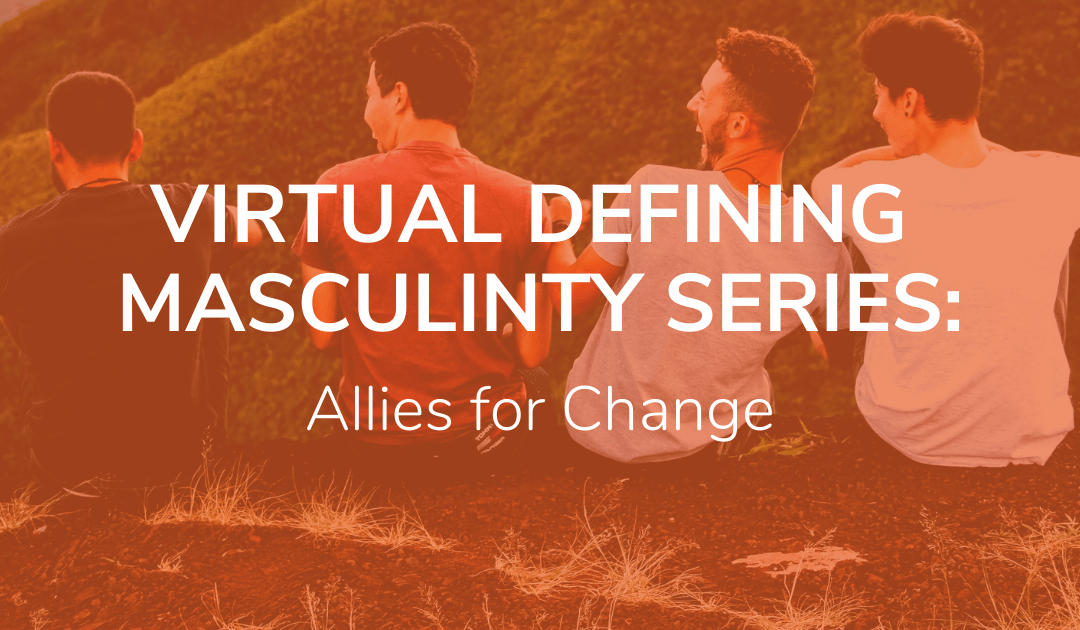Virtual Defining Masculinity Series
Allies for Change
Seth Snoap, Men As Allies Coordinator
Through the years, the simple statements like “man up” that were meant to get us to stop crying over something ‘insignificant’ evolved. They became more demanding, pushing us to “be tough”, to “get over it”, to “grow some balls”. These statements not only affected the way we saw ourselves, but also began to affect the way the we viewed women. As expectations stacked on top of each other one by one, a rigid definition of what a “real man” should be formed. It included how a “real man” walked, talked, acted, and reacted to situations. It made each and every one of us unconsciously blind to the social issues happening all around us, one of the largest being sexual assault and domestic violence.
As men, we continuously say that these issues are horrifying. But why is it that when it comes time to take a stand, all of the sudden it’s not our problem? Why is it that our masculinity is so defined by societal views that it is more important to protect our image than to take a stand and get invested in issues that actually matter? Is our definition of who we are as men so fragile and rigid that adjusting our world view so that we truly see what’s happening around us something that would shatter that? Does “being a man” really mean that we are supposed to disregard the simple rights that we all deserve and want?
I am aware of how uncomfortable this may make you, because we have not been trained to talk about any of this. We haven’t been trained to talk about our feelings, our masculinity, or social issues in the way that we should have been, but I need to put this plainly: the underlying causes of violence and discrimination against women are rooted in the ways that women are traditionally viewed in our society. We as men are taught to view women as objects, as property, or that they are of less value than men. These ideas are not always directly taught, it may be through locker room talk or the way that things are portrayed in movies and the media, but they are being reinforced daily, and it’s time for it to stop.
It is our responsibility as men to put an end to this. We can’t continue to let degrading jokes and behaviors slide in order to gain a few laughs. We can’t let ourselves believe that being feminine is synonymous to being weak. We can’t let words that demean and objectify continue to run rampant in our everyday vocabulary.
I believe that men are better than that. I believe that it’s time for us to start having the hard conversations with each other in order to unravel those ideas that are so deeply ingrained in us. We need to raise our voices in support of the women all around us and the wonderful work that they have been doing for decades, because they can’t continue to do it alone. It is time that men begin to embrace a healthier, more respectful manhood. We can help prevent violence and discrimination. We can promote a better society for all of us. We NEED to begin to view sexual and domestic violence as an issue we ALL need to care about. This is how we’re going to create lasting change. When men finally begin to listen, to learn, to empathize with one another – then, and only then – will we see a drastic reduction in sexual and domestic violence throughout society.
I will tell you this: it will not be easy. It will not be easy to take a stand. It will not be easy because you’re not only going to have to look within yourself and re-examine all that you thought you knew, and all you’ve ever done, but you’re also actively standing against the culture that we are in and have grown up in. You are going to have to speak out against things that are uncomfortable to talk about, and you are going to face those who vehemently oppose the mission you’re fighting for. You are going to have to fight the good fight, every single day, to stand up for what you believe in. You’re going to have to work to create a new generation of men who stand up for basic human rights, and who encourage each other to make better decisions, because it’s what women deserve, and it’s what we as a culture deserve.
You can make a difference that could change our culture as we know it.
Click here to view a recording of our virtual discussion on becoming Allies for Change.
